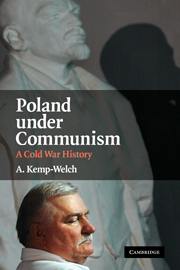Preface
Published online by Cambridge University Press: 06 January 2010
Summary
In 1989, Poland became the first country to leave communism peacefully. Its ruling generals invited leaders of the outlawed Solidarity to a Round Table on the future of communist power. Expecting to co-opt the opposition, they were swept away by an electoral avalanche and resigned. Solidarity then formed the world's first post-communist government. Within a few months, the Polish paradigm was emulated across all of Eastern Europe.
Afterwards, many actors claimed the credit. Soviet leaders from the Gorbachev era state that they took power in 1985 determined to withdraw from the region. They argue that their message was misunderstood by their East European counterparts, or simply disbelieved. Western officials are no more reticent in attributing to their own actions – whether CIA funding at critical junctures or the quiet word in the oppositional ear prior to the Round Table – the decisive tilting of the balance towards freedom. Some Catholic publicists – though not the Vatican – report that the Pope, in private audience with General Jaruzelski, put Poland on the path to power-sharing. Finally, Polish communists themselves declare that they always wished to liberate their country and had done so the moment geopolitics permitted. We are invited to believe that 1989 was the consummation of ‘revisionism’ they had espoused since 1956.
This book will take account of these prominent players. But it will also include the unsung heroes, easily overlooked by historians, and less able to claim their place in history.
- Type
- Chapter
- Information
- Poland under CommunismA Cold War History, pp. ix - xPublisher: Cambridge University PressPrint publication year: 2008

